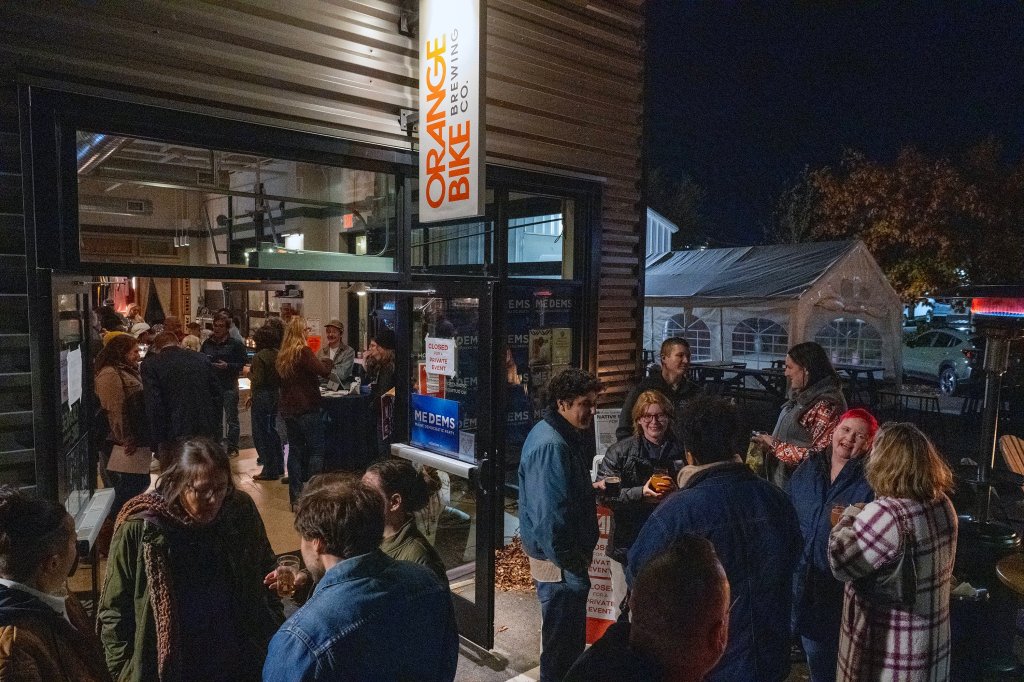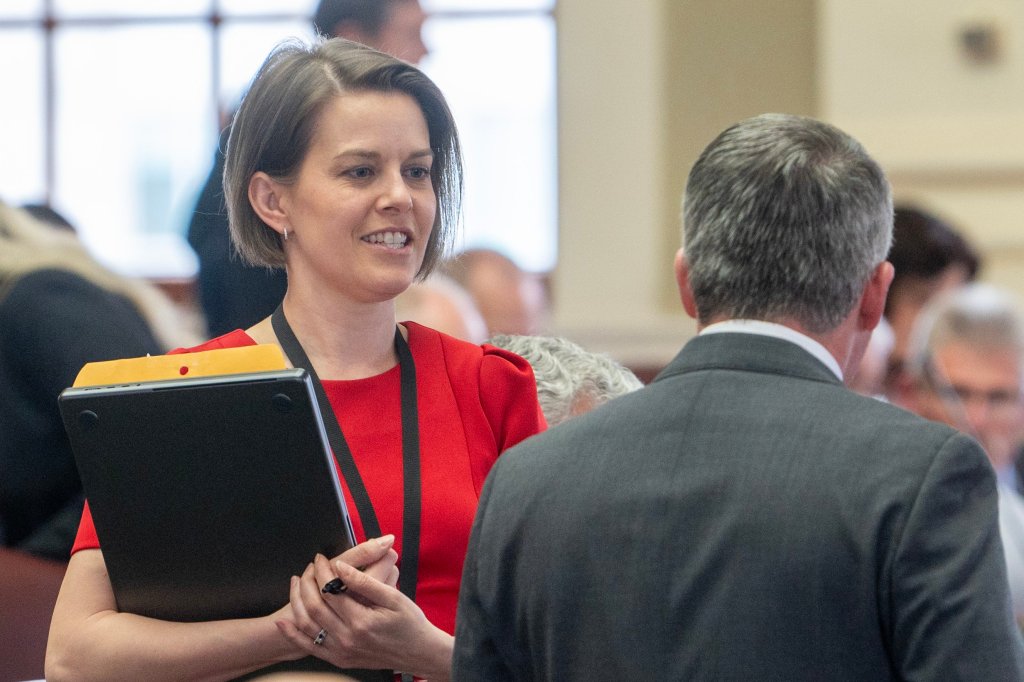
A citizen referendum to enact a voter ID law was overwhelmingly rejected Tuesday in large part because opponents successfully reframed the proposal around restrictions on absentee voting, an option Maine voters like.
“I think if it had focused just on voter ID, I think it would have been a slam dunk,” said Sen. Brad Farrin, a Republican from Norridgewock. “You see the whole No on 1 campaign, there was hardly any talk about showing an ID. It was all about the restrictions on absentee voting and (it) scared people.”
With 90% of precincts reporting results Wednesday afternoon, nearly 64% of voters voted against Question 1. The only public poll on the question, released last month, predicted a much closer outcome.
Devon Murphy-Anderson, executive director of the Maine Democratic Party, said the lopsided result shows Mainers don’t want any increased barriers to voting. During last year’s presidential election, 45% of all ballots cast were absentee.
“If our neighbors’ and families’ and communities’ right to vote is threatened, we as Mainers will take a stand and we will fight,” she said at an election party in Portland after declaring victory.
Republicans are now grappling with the result and questioning whether pairing voter ID, which exists in 36 other states, with changes to absentee voting was a wise strategy. This soul-searching comes as attention shifts to the 2026 cycle, which will include races for the U.S. Senate, governor and state Legislature.
Steve Robinson, editor in chief of The Maine Wire, an online news source for conservatives, called the move “a tactical blunder” that starved the campaign of resources.
“Donors saw the flaw, and Yes on One lacked funding,” Robinson said on the social media site X. “A simple Voter ID measure would likely have gained more votes, given its popularity in Maine, and could have impacted Question 2 (the red flag referendum) with a proper ad campaign.”
Robinson and The Maine Wire also published many stories questioning the security of Maine’s elections with claims about noncitizens possibly being enrolled to vote and absentee ballots that somehow ended up in a battered Amazon box delivered to a Newburgh woman — ballots that would be nearly impossible to cast either by mail or in person.
Those fears didn’t appear to carry as much weight as concerns over how Question 1 would have changed voting in Maine.
Alex Titcomb, who led the Voter ID for ME campaign that gathered over 170,000 signatures to get the question on the ballot, said his team has no regrets about their proposal, though he did concede a straight vote on voter ID alone would have likely passed.
“I’m proud of our effort and the decision of my team to put forward the initiative as is,” Titcomb said.
A DIFFERENCE IN MESSAGING
Yes on 1 supporters kept their messaging focused on voter ID, betting that enough people would support something they considered a common-sense requirement that exists in dozens of other states.
The No on 1 campaign, a coalition of 35 organizations led by the Maine Democratic Party, instead focused on how the proposed restrictions on absentee voting could make it harder for shift workers, rural residents, and for elderly and disabled people to vote.
In addition to requiring a photo ID when casting a ballot, the proposal would have eliminated two days of early voting, prohibited requests by phone and from family members for absentee ballots, prevented people from receiving absentee ballots annually without requesting them, limited the number of ballot drop boxes and banned prepaid postage on return envelopes.
Some voters were able to look past those major changes if it meant having voter ID.
“For voter ID — we need to have IDs if we buy a beer, take out a loan or go to the bank,” Greg Rand said after casting his ballot at the Kennebec Valley Boys & Girls Club in Gardiner. “And voting’s very important.”
Others, however, were swayed by concerns over the changes Question 1 would have made to absentee voting.
“To take away any absentee voting, that just doesn’t make any sense in one of the most rural states in the country,” Terry Walker, 50, said after casting his ballot at the South Portland Community Center.
Anna O’Sullivan, 42, also voted “no” on Question 1, saying “It’s scary when our government restricts voting access.”
And Winslow resident Pauline Veilleux, 76, said she couldn’t support any proposal that might “prohibit people from voting.”
DID A NATIONAL ‘BLUE WAVE’ HELP?
The day after the election, the Yes on 1 campaign placed most of the blame on the ballot question language drafted by Secretary of State Shenna Bellows, a Democrat, saying the wording emphasized the impact on absentee voting.
Proponents challenged the wording of the question in court and lost. After that, Titcomb said he feared the proposal was doomed.
“It’s not a surprise,” he said. “We knew that how it was written was extremely biased and influencing people to a ‘No.'”
Nicholas Jacobs, the Goldfarb Family distinguished chair in American government at Colby College, said many voters were likely surprised to see the breadth of the proposal, which had initially qualified for the ballot as a simple referendum on voter ID.
“The problem wasn’t the wording of the question — it was the scope of the proposal itself,” Jacobs said. “I’ve been very critical of the secretary of state on other matters, but in this case, the office was right to describe it fully. Transparency here no doubt made the difference. And I think transparency is always a good thing for the state.”
Farrin, the Republican senator, said including a host of other changes in Question 1 gave opponents “a playbook to beat it.”

State Rep. Laurel Libby, R-Auburn, a lead proponent, said the proposal reflects best practices, but like Titcomb, she conceded it would have stood a better shot if it had been limited to voter ID.
Still, she blamed defeat on Bellows and the “blue wave” that swept across the country, referring to races in Virginia, New Jersey, New York and California that many see as a response to the Trump administration.
“Never could we have, you know, anticipated that Secretary of State Shenna Bellows would so dramatically weaponize the ballot question,” Libby said. “I think at the end of the day, there’s no amount of additional funding that would have made up for the ballot question as it was written, or certainly the lies that were shared across the state regarding absentee voting being removed.”
Staff Writers Joe Lawlor , Amy Calder and Ethan Horton contributed to this story.

We invite you to add your comments. We encourage a thoughtful exchange of ideas and information on this website. By joining the conversation, you are agreeing to our commenting policy and terms of use. More information is found on our FAQs. You can modify your screen name here.
Comments are managed by our staff during regular business hours Monday through Friday as well as limited hours on Saturday and Sunday. Comments held for moderation outside of those hours may take longer to approve.
Join the Conversation
Please sign into your CentralMaine.com account to participate in conversations below. If you do not have an account, you can register or subscribe. Questions? Please see our FAQs.